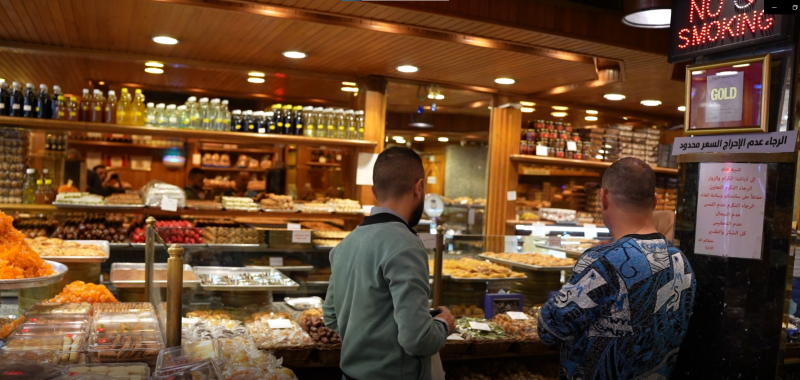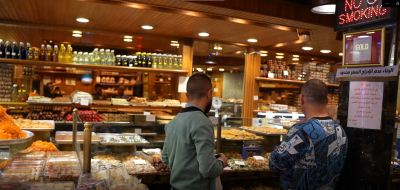With empty pockets, the month of Ramadan has arrived this year in Lebanon amid a suffocating economic crisis that has deprived Lebanese people of the most basic necessities of life. With the skyrocketing prices of food items and the decrease in purchasing power, Ramadan tables have become limited to essentials, depending on each individual's financial situation.
Once a staple in iftar meals, the fattoush salad has now become a burden, with a single lettuce costing nearly 100,000 Lebanese pounds. How can a citizen with a meager salary secure the price of this dish? During a tour by "Wardena" in the streets of Beirut to assess market conditions, a Lebanese woman in her forties expressed her anger, stating: "There is no accountability, the prices are insane. I can no longer buy anything. We have already given up meat, and we may give up vegetables later, perhaps even air. We will have nothing left but the mercy of God." She added, "My salary does not exceed seven million pounds, and this amount barely allows me to purchase the minimum food items like grains and vegetables."
The situation of this woman mirrors that of all citizens, who have resorted to cheaper alternatives in line with the dire circumstances the country has fallen into.
**Price Differences in Supermarkets**
Prices in supermarkets have been affected by sharp fluctuations in the exchange rate of the dollar, and discussions of prices have become a "continuous shock," with new increases occurring daily, alarming people who cannot keep up with the situation. Mazen, a man in his fifties, complains about the price variations and their outrageousness, noting that buying food items has become "a tedious task I endure weekly, searching for the cheaper options."
Hanan, a mother of three daughters, agrees with him, as she shops regularly and returns home with bags and many disappointments. She tries to explain the price discrepancies between supermarkets in disbelief, saying, "I bought a bag of sugar yesterday for 220,000 pounds, only to later find out that my husband bought the same bag of sugar for 128,000 pounds from another store. The difference between supermarkets has become equivalent to a dollar."
Outside, Um Hadi sits in front of her modest shop, speaking about the shortages she faces. She couldn't secure what she needs for this holy month, and with a heavy heart, she says, "There’s no jellab this year, nor dates, just bread!" She points out that traders deal with her in U.S. dollars, yet she cannot price in dollars within her shop due to people’s inability to bear seeing small numbers that now equal everything they possess.
**No "Koulaj" This Year**
If the reality for vegetables and essential food items is tough, then sweet shops appear almost empty, unlike previous years when they would witness a rush during this month. These shops now await those who can afford to adorn their iftar meals with delicacies, should they exist at all. For example, some stores state they cannot produce "Ramadan Koulaj" due to the exorbitant prices of oil.
In light of these difficult living conditions, citizens have not only given up certain types of food and drink but have also begun to abandon special customs of the holy month, such as exchanging food items among relatives and neighbors, as people can barely secure their daily sustenance.
**From Market Economy to Bad Economy**
As the Lebanese pound continues to bleed against the U.S. dollar, it seems conditions are heading toward the worse. In this context, economist Ahmad Jaber explains in a talk with "Wardena" that the inflation rate has become high and "we have entered a phase of hyperinflation." He points out that several reasons have contributed to this reality, the most notable being "the collapse of the currency's exchange rate against the dollar, alongside the costs of energy, transport, and fuel."
Jaber adds, "Our economy is a market economy, but it has turned into a bad economy due to the lack of any controls and oversight." Meanwhile, the Ministry of Economy is supposed to monitor prices, "yet it has been absent from hearing," and regarding the hotline for complaints, "one could go on and on."
This year, Ramadan arrives burdened with deprivation and high prices. The economic crisis, along with the accompanying political and social crises, has led to warnings from global entities about the dangers of continuing in this situation, as worse may come. This warning has reached the hearts and wallets of the Lebanese, leaving them with nothing but prayers that this holy month brings keys of hope for a better future.




